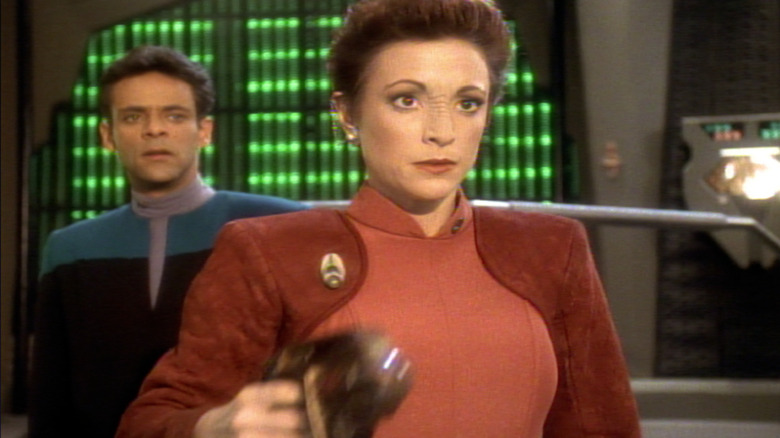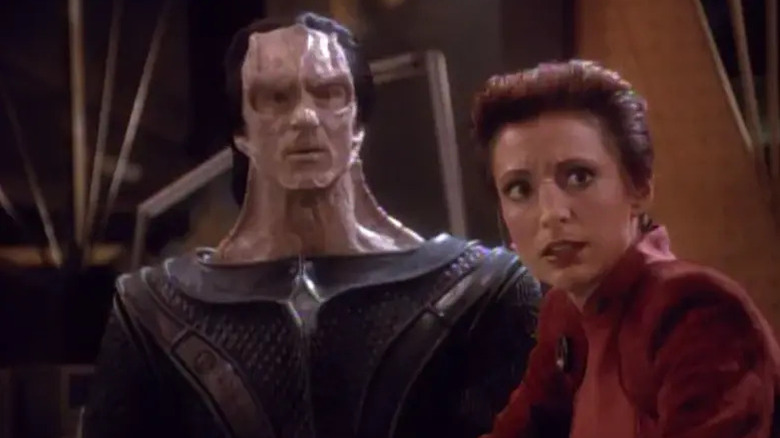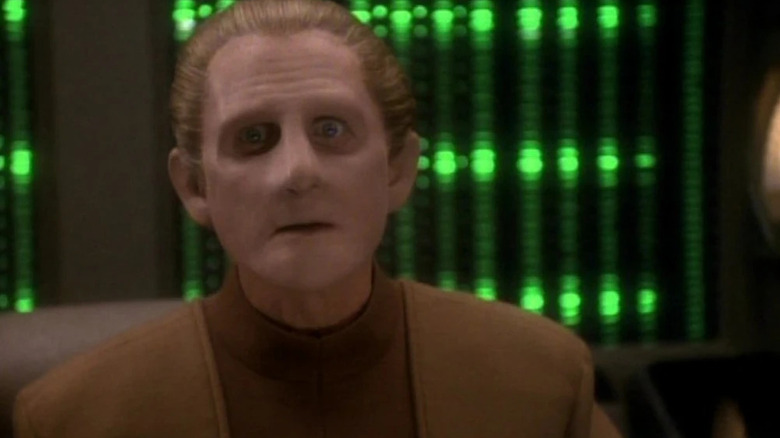An Underrated Star Trek: Deep Space Nine Episode Has A Much Deeper Meaning Than You May Think
In "Civil Defense," one of the many great episodes of "Star Trek: Deep Space Nine," Commander Sisko (Avery Brooks), his son Jake (Cirroc Lofton), and Chief O'Brien (Colm Meany) are in a rarely visited ore depository on Deep Space Nine, which they hope to renovate and make useful again. The show's space station setting, to remind readers, used to be an ore processing facility overseen by the fascistic Cardassians and populated by a retinue of enslaved Bajorans. When the Cardassians' military occupation of Bajor ended, they bequeathed the station to the Bajoran population, and the Federation came in to take command of DS9 while Bajor underwent its own turbulent reconstruction.
After three years on DS9 (at the time of "Civil Defense"), the establishment still isn't operating at 100% efficiency. There are large portions of the station that need to be repaired or replaced, and a lot of the machinery just doesn't work. It was rundown to start with, and the Cardassians obnoxiously trashed the joint on the way out. It's all Commander Sisko can do to keep the place livable. At least the Promenade — with its casino/bar, chapel, shops, and school — is running well.
While sprucing up the long-neglected depository, Sisko, Jake, and O'Brien accidentally trip a dated, automatic Cardassian security program. The station's former commander, the all-timer "Star Trek" villain Gul Dukat (Marc Alaimo), appears on a screen, announcing that they are trapped after their criminal attempt at staging a workers' revolt. The pre-recorded security message was intended for potentially escaping Bajoran workers, you see, and no one knows how to shut it off. The bulk of "Civil Defense" is thus an "escape room" episode wherein the heroes try to outwit the dated security program, only to find that it activates more and more complicated booby traps that've been hidden on D29 for years.
But there's more going on in "Civil Defense" than just clever escapes and mounting stakes. The episode seems to be pointing out that ridding the world of fascism isn't as easy as the fascists leaving the room. The echoes of fascism linger.
Civil Defense is a great thriller episode of Deep Space Nine
"Civil Defense" came out in 1994, and the show's creatives could not have guessed how prescient it would be. "Deep Space Nine" is about the wounds left behind by a fascist dictatorship and how reconstruction is a long, dangerous process. The planet of Bajor may be rid of the Cardassian occupants, but the planet, in trying to build up a new government, now stands poised to fall into a corrupt theocracy. Additionally, the Cardassians have been kind of floating around nearby in the hopes that Bajor will fall again, allowing them to swoop in and re-occupy the planet.
"Civil Defense" shows that Deep Space Nine, while in active operation by the Federation for three years, is still not free of its original function (nor of its original evil). The station still bears the scorch marks of slavery, oppression, and genocide. Just when Sisko (whom some at /Film have declared the best "Star Trek" captain) and his Starfleet co-workers started to see the station as a home, a deeply-set security program reminded them that, no, the ghost of wickedness isn't finished with them. As the episode progresses, the security program begins to become stricter and stricter. It assumes that a Bajoran workers' revolt is occurring, and the station erects force fields to keep them in place. Weapons appear inside replicator stations and begin firing on anyone who is not a Cardassian (which is everyone). Eventually, the real-life Gul Dukat is alerted to the "revolt" that is happening and comes to visit the station, mostly to gloat at how clever his security program is.
Of course, when he tries to leave the station, a secondary security program is triggered, assuming he was trying to abandon his post. Now, the fascist is trapped in the memory of his own fascism. His automated death machines can no longer discern who it should be oppressing, so it just oppresses everyone.
Civil Defense allows Deep Space Nine to explore the lingering effects of fascism
The message, of course, is that fascism keeps killing you, long after you're dead. The lingering damage and resentments aren't going to go away easily, and its threat will always remain.
One can see that message lingering in the modern world of the 2020s, where authoritarianism seems to be on the rise all across the globe. We live in a world that barely survived World War II and that still remembers the horrors of a fascist state run amok. WWII was the ultimate betrayal of humanity's promises to itself. Our philosophical humanism was supposed to bring us together, not create a sense of superiority and a need to dominate other nations. Our sciences were supposed to cure us and construct a glorious new world of health, travel, and communication, not create junk eugenics and produce world-destroying bombs. WWII was proof that we failed ourselves. After the damage was done, the world needed to be more careful about authoritarians moving forward.
Fast-forward a generation, though, and the lessons seem to have been forgotten. The fascist security programs remained deeply embedded in human society, and, in our complacency, we accidentally triggered them. There are warmongers and corrupt oligarchs in charge of multiple countries now, and many of them are using increasingly aggressive language — language that resembles the evil, angry words we remember from WWII.
"Civil Defense" is a fun mousetrap episode, of course (and my favorite "Deep Space Nine" episode). The episode's writers made the tech issues clever and difficult and the escapes appropriately challenging for the characters. But the episode also stands a reminder that we should never be complacent in the wake of fascism. The evil is always lurking like a hidden computer virus, waiting for you to make a misstep. We don't ever want to be trapped.


